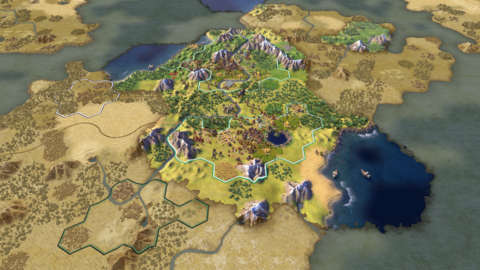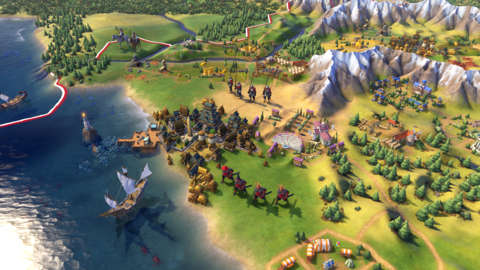The original Civilization came out in 1991. I was five years old at the time. I didn't fully grasp the game's historical underpinnings or strategic subtleties, but I do remember playing with my dad and racing to build catapults before other leaders had a chance to expand their empires too far. Because even though the first game laid the groundwork not just for future Civ titles but for the strategy genre as a whole, it was, essentially, a glorified arms race.
Yes, you could found cities, build world wonders, and unlock new options through technological research, but inevitably, combat played a central role. Just like a real civilization, however, the franchise evolved over time, gradually grafting new ideas onto its classic framework--a process that’s now culminated in Civilization VI: the deepest, most well-rounded base game the series has ever seen.
More than ever, every win condition feels equally rich and equally viable, whether you’re pursuing culture, religion, science, or domination. You can build arts districts that allow you to more quickly accrue culture points and attract great artists. You can create new religious units like apostles to more efficiently spread your gospel to world. You can use the builder unit in new ways to better capitalize on the resources that surround your cities, accelerating humanity’s ascent into space.
And of course, you can still amass a formidable army, but even warfare presents new considerations that force you to lean on other systems beyond battle tactics. Maintaining military units, for example, is expensive, but picking trade routes with a high gold yield helps mitigate the financial impact. War weariness will eventually lead your population to revolt, but using diplomacy to squeeze luxury resources out of your allies can quell rebellion. And espionage, now deeper than ever, lets you not only place spies but pick specific missions for them to carry out.
Civ 6 is packed with added nuances that enrich existing systems, but it also makes some major changes, the biggest of which is “unstacking” cities. Rather than occupy a single tile on the world map, cities now sprawl outward, allowing you to capitalize on each city’s specific surroundings--assuming you exercise some serious foresight. Certain structures, for example, function more efficiently on specific types of land, while others can only be built if certain typographical demands are met. Not only does this change the way you consider the board, it also adds a new strategic layer that fills a gap and creates greater variety in the types of thinking Civ demands.

Along with planning each city’s long-term development, you must also manage its housing and amenity needs. These replace the global food and happiness levels of previous Civilizations and make individual turns more engaging in the process. Where previously you could mentally check out for a few turns while waiting for your big picture decisions to pan out, you must now actively monitor and improve each city’s condition. It can be a little exasperating and tedious, but ultimately, I realized each and every city contributed to my overall success and, consequently, provided unique opportunities for strategic gain.
You’ll find a host of slightly smaller but equally smart changes as well. You can now tailor your government to your specific playstyle by earning various policy cards that impact everything from war weariness to cultural output. Civics replace social policies and now function identically to technologies: pick one from an expansive tree, spend a few turns researching it, and unlock new cultural possibilities like theocracy or globalization. And with the addition of active research, you can cut research time in half by meeting specific, logical conditions tied to individual Techs and Civics--settling next to a coast will boost your research in sailing, for instance. This practice ensures an advantage for vigilant players.
Smart though these changes may be, they are accompanied by several notable imperfections. Tourism, for example, is the metric by which Cultural Victories are measured, yet the math behind it is esoteric at best. Missionaries and other religious units are similarly opaque. Though I did manage a Cultural Victory during one match, it required some frustrating trial-and-error guesswork, and Religious Victories seem slightly too easy to achieve once you uncover the ideal method for maximizing your output. And while you could argue that commerce and diplomacy facilitate every win condition, it’s a shame neither serves as a win condition itself.
The UI could also use a few refinements. There's absolutely no rhyme or reason to "Unit needs orders" notification, for example. Rather than directing your attention to units already on screen, it arbitrarily whips around the map, seeming highlighting units at random. I experienced a few performance hitches as well, like noticable delays between selecting the Civics menu and the menu actually appearing on screen. Nothing I experienced ever became intolerable, thankfully; my frustrations generally topped out at "annoyed." And other aspects of the presentation--most notably the instrumental score and Sean Bean's excellent voice work--definitely won me over.
Perhaps most crucially, though, opponent AI proved to be a bit of a mix. Catherine Medici was clever enough to preemptively declare war against me when she saw my troops massing at her border, and even brought anti-cavalry units to take down my tanks. Cleopatra, on the other hand, seemed to capriciously switch strategies--from religion to domination and back again--and just floundered uselessly as a result.
If nothing else, the new agenda system does imbue each leader with a discernable playstyle, and when one denounced me, the game explicitly told me why, making diplomacy a more straightforward affair. And even on higher difficulties, none of opponents broke a treaty or attacked me arbitrarily. In fact, I spent an entire match trading with Norway without issue.

Of course, you can avoid the AI altogether by playing online--just one of Civ 6’s many options. There’s a tight, well-executed tutorial for newcomers that briskly runs through the game’s major mechanics, as well as a “New to Civ 6” tips option that focuses specifically on everything that's changed since Civ 5, which should soften the learning curve for veterans looking to jump straight into the deep end. There's a lot to account for, but the fact that every new system slots logically into Civ's established structure makes the game relatively accessible despite of its depth.
Adjustable match parameters return as well, allowing you to adjust not only the difficulty but also the number of opponents, the presence of barbarians, and the overall map size. That last one is especially crucial since the "standard" size has decreased, most likely to force more interaction. Playing on larger maps with fewer opponents seems to work just fine, though. International trade takes longer and territorial expansion is far easier, but the game still plays largely the same.
Civ 6 has a few rough edges, but they’re pushed far into the periphery by spectacular strategic depth and intricate interlocking nuances. Any frustrations I experienced were immediately eclipsed by my desire to continue playing. Just one more turn, every turn, forever.